Experience
 I
do leveling through the milestone technique rather than experience points.
Using experience points turned
into another numbers mess I had to deal with, and I simply got tired of
it. Not only that, there were always hurt feelings because people got less
than others and felt slighted in some way. That, and players would run off
on side adventures way too often with the mind of gaining more exps.
I
do leveling through the milestone technique rather than experience points.
Using experience points turned
into another numbers mess I had to deal with, and I simply got tired of
it. Not only that, there were always hurt feelings because people got less
than others and felt slighted in some way. That, and players would run off
on side adventures way too often with the mind of gaining more exps.
As long as everyone participates on a marginal level
to promote the good of the party, they'll rise equally. I've developed a
feel for when the party is ready for the next level and will raise them
all en-masse accordingly. Usually, I'll bump them up fairly rapidly until
they reach 3rd level so they can survive a couple of hits and also gain
access to subclass features. This has
worked well and everyone seems to be happy because there is no "why is he
leveling faster than me?" to stir up things. Everyone is equal in their
progression and people can focus more on the story and nuance of the game rather
than the numbers.
Top
How Magic Works
 Arcane
magic is employed by arcane spell casters, such as wizards, warlocks,
sorcerers, and a few others. Deities bestow divine (holy/unholy)
upon worshippers, such as clerics and paladins. Although
the divine and arcane spell effects are identical in that both use
verbal, somatic, and material components, there is a difference.
Druids stand apart. They use divine magic, but it is not bestowed by
a particular god. Rather, they draw their abilities from nature,
which is an entity of a sort but not a real "god."
Arcane
magic is employed by arcane spell casters, such as wizards, warlocks,
sorcerers, and a few others. Deities bestow divine (holy/unholy)
upon worshippers, such as clerics and paladins. Although
the divine and arcane spell effects are identical in that both use
verbal, somatic, and material components, there is a difference.
Druids stand apart. They use divine magic, but it is not bestowed by
a particular god. Rather, they draw their abilities from nature,
which is an entity of a sort but not a real "god."
Although arcane and
divine magics are considered different, the raw energy they use is
the same. The main differences lie in how the magic comes to the
caster. Many believe that arcane casters' bodies are taxed more
because of the extra effort involved in bringing the magic to them
from one of two planes, but this has been a hotly contested debate
since anyone can remember with no end in sight.
Detect magic will tell
the caster if the detected magic is divine or arcane.
Arcane
With knowledge created
centuries ago, arcane casters open invisible portals to the positive
and negative planes, summon raw magic to the plane they are standing
on, channel it through their bodies, refine and shape it, and then
release the magic to create spell effects.
Divine
Divine casters' bodies
are imbued with all the necessary magical energy for their spells by
the will of their gods. They use faith and their components to
shape and then release the magic to create spell effects.
Top
Feats
 In
the PH, you get feats. Some are built into backgrounds, but most
come from achieving certain levels.
In
the PH, you get feats. Some are built into backgrounds, but most
come from achieving certain levels.
If you have a homebrew feat you'd like to
use, feel free to submit it to me for review. You never know, I
might be feeling generous that day. Also, be sure to check the
Rules
Page for any current feats that have been changed.
Top
Meta Gaming
 I'm
pretty strict on this. If you (and your character) know something, but
your character isn't present, then keep the hatch battened down. You canít
give out sage if your character isnít around, or dead, or is frozen while
trying to play a cursed lute. We wouldnít want any stray anvils hitting
your character on the head and causing damage, now would we? Helping with
rules and keeping track of hit points and dead guys and other stats as the
game is going on is okay. Below are the two basic rules (more may come) I
expect everyone to follow:
I'm
pretty strict on this. If you (and your character) know something, but
your character isn't present, then keep the hatch battened down. You canít
give out sage if your character isnít around, or dead, or is frozen while
trying to play a cursed lute. We wouldnít want any stray anvils hitting
your character on the head and causing damage, now would we? Helping with
rules and keeping track of hit points and dead guys and other stats as the
game is going on is okay. Below are the two basic rules (more may come) I
expect everyone to follow:
1. Don't try to play another person's character
for them. Too many times, player A will be asked what they (their
character) is doing. Then, player B will answer or begin telling player A
things they shouldn't because they don't have the knowledge or their
PC isn't there or whatever. Give the player whose turn it is, or is being
addressed, a chance to answer or do whatever they are going to do.
2. Don't be a Jiminy Cricket. If a player is
announcing what their PC is about to do, that's not a queue for you begin
telling them what they should do, or to remind them of all the plusses
they have. You may mean well, but you are depriving that person of the
chance to explore their character's abilities themselves through trial and
error.
Now, if the player--whose turn it is--asks the
players at the table for clarification on their pluses, or saves, or
damage, a rule, or whatever, then it's okay for the other players to advise them.
*NOTE* This is not an opportunity for the other players to open up and
begin offering strategy about what to do. By the same token, the player
asking for clarification on a rule or so forth may not ask for strategy
advice, unless they role play their character asking other PCs what
to do. And in that case, I will limit how in depth the conversations will
be.
Offenders will be warned. Consistent offenders
will see things happen like A: their PCs will be placed at the bottom of
the initiative, or B: I will not allow a player to use the offender's
recommendation. Eventually, the other players will begin to help police
the offenders.
My goal isn't to impose frivolous rules and
regulations upon you. I simply want everyone to enjoy the experience of learning about the game on their
own through simple trial and error, as well as allow them to role play at
the level of their PC rather than the vast player knowledge that they have
or that the people at the table are giving them.
Top
PC Development
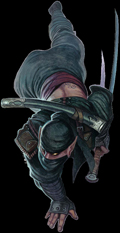 I
love nothing more than someone who takes an ordinary character and plays
it extraordinarily. Give me a rich character history (that isnít
outlandish) and Iíll weave it into the campaign's tapestry. During prior
campaign with a group called the FRM (Fine Red Mist), I realized that in order for me to hold true to
the above promise, I really needed to make a campaign as I go rather than
try to make one from beginning to end and THEN plop the characters into
it. This way I can really have fun with each characterís
history and development. This is another reason why showing up is so
important. "Well, since Hector the Paladin isn't here today, that cool
encounter with the bad guys to rescue his warhorse won't happen." Looks
like Hector'll have to ride his battle donkey a little longer.
I
love nothing more than someone who takes an ordinary character and plays
it extraordinarily. Give me a rich character history (that isnít
outlandish) and Iíll weave it into the campaign's tapestry. During prior
campaign with a group called the FRM (Fine Red Mist), I realized that in order for me to hold true to
the above promise, I really needed to make a campaign as I go rather than
try to make one from beginning to end and THEN plop the characters into
it. This way I can really have fun with each characterís
history and development. This is another reason why showing up is so
important. "Well, since Hector the Paladin isn't here today, that cool
encounter with the bad guys to rescue his warhorse won't happen." Looks
like Hector'll have to ride his battle donkey a little longer.
Another aspect of development
is what it takes for a character to live his/her/other life in the world.
See the "Training and
Other Expenses" section above.
Top
PC Generation

Please use either the 27 point buy system as outlined
in the PH **OR** roll four d6, reroll any ones and take
the best three totaled. Do this 6 times and place the results on the stats
for your PC.
Starting gold is the max for each class. You've been
a good little piggy in saving your coppers. And remember, you are naked
when you start spending.
It's imperative that you provide me with a
full, detailed copy of your character sheet so that I know where you're
at. This also helps when you canít make it and we really need your
smart-assed thief to help assault the whatever. Also, how can you expect
me to kill your character if he/sheís not there? If you prefer
that your character NOT be played in your absence, I will keep
him/her out of the fray. Iíll just encase the character in carbonite and
let Jabba play handball off of it while Leia talks to it with a really bad
cold.
Starting Wealth
The new 2024 Player's Handbook doesn't really
have starting wealth listed by class as it was with the 2014 PH. I like
the old style, so I'm listing the gold here. At 1st level, your character
is naked and has the full starting gold for his/her/its class.
|
Class |
Starting GP |
|
Barbarian |
80 gp |
|
Bard |
200 gp |
|
Cleric |
200 gp |
|
Druid |
80 gp |
|
Fighter |
200 gp |
|
Monk |
20 gp |
|
Paladin |
200 gp |
|
Ranger |
200 gp |
|
Rogue |
160 gp |
|
Sorcerer |
120 gp |
|
Warlock |
160 gp |
|
Wizard |
160 gp |
Top
Prestige
 Your actions will speak for you, individually and
collectively, and those actions will have a significant bearing on how you
are treated as word gets around. I had a group literally torture some
innocent citizen in a church because they thought he had information they
needed. Later on, they gaped at me in utter astonishment when word got out
concerning their deed and they were literally barred from the next town.
Your actions will speak for you, individually and
collectively, and those actions will have a significant bearing on how you
are treated as word gets around. I had a group literally torture some
innocent citizen in a church because they thought he had information they
needed. Later on, they gaped at me in utter astonishment when word got out
concerning their deed and they were literally barred from the next town.
This may be a fantasy game, but I apply real
world logic and mechanics in many cases. Please keep that in mind when
playing your character and how others react to their deeds or misdeeds.
Top
Psionics
 Psionics are no longer allowed in my world.
You may encounter monsters with psionic abilities, but that will occur as
part of a random encounter or adventure. Above all, you will not
face psionic opponents you cannot defeat or run away from.
Psionics are no longer allowed in my world.
You may encounter monsters with psionic abilities, but that will occur as
part of a random encounter or adventure. Above all, you will not
face psionic opponents you cannot defeat or run away from.
This may change in the future. But for now, this
is the ruling.
Top
Races
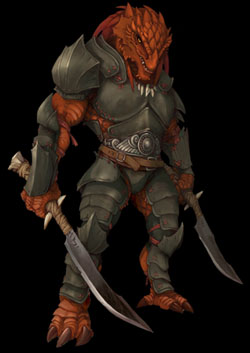
The playable races in my word
range from, but are not limited to: Aarakocra, Aasimar, Centaurs, Draconians (Dragonborn), Dwarves, Elves,
Genasai, Gnomes, Goblins, Half-Elves, Half-Orcs, Outhiri (Halflings), Humans, Kenku,
Svirfneblin (Torozen), Duergar (Barethkor), Lizardfolk (Sethraak),
and Tieflings, There are also some playable races with statistical
information included below, such as the Half-Tabaxi, Ratkin,
Qiran Esh, Kryth, and Thriiche (arctic elf). Each listed race has
their own variants/traits/abilities. Other races, such as the ones
listed in Volo's Guide to Monsters, are allowable. Keep in mind that
a race that is uncommon in a human-centric society, such as a
tiefling, may be looked at with anything from curiosity, to fear, to
hatred, etc. In other words, playing a cool race to get cool bennies
may come with some offsetting situations. Be prepared. NOTE: races
that are not allowed in my game are: Astral Elves, Eladrin, and
Shadar-Kai.
For example: In Irith, dragons are quite
uncommon. Draconians will be rare and looked upon (in many cases) with fear and
derision. Anyone playing a Draconian will encounter this attitude
in nearly any civilization they visit. This can also be a problem
for anyone utilizing an uncommon race. Think of a feared Shenuri
(dark elf) trying
to walk among men in a predominately human town. How long do you
think those men will tolerate that Shenuri's presence before a
confrontation of some kind ensues?
As for utilizing races not
listed here, I'll consider them. They must be submitted to me and my
current gaming group for consideration to allow me the chance to weed out any
problems and to check for compatibility and balance.
Some tweaks have been made to individualize
things in the world of Irith. Some traditional races have new names.
Old Races With Additional Information
Below are existing races that I feel
require additional information for my players. After that is a
section devoted to homebrew races and their playable information.
Barethkor (Duergar)

A race of dark dwarves.
They almost exclusively
dwell underground, specifically beneath mountains and hills. They
are very clannish and suspicious of outsiders.
A page with more information
regarding the Barethkor, along with their cities, populations, etc.
on each continent can be found
HERE.
NOTE: For playable information regarding
this species, go
HERE.
Top of Page
Centaurs
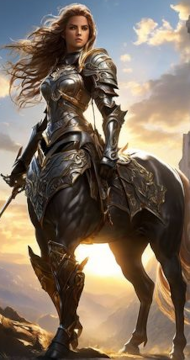
Legend has it that many centuries ago,
somewhere in and around the lands that are now known as
Brighkly, there lived a tribe of barbarians known as the Outrai. One
day, a group of Outrai caught wind of a rumor that a herd of sacred
horses belong to Vor himself would be grazing in lush valley. Tired
of having fought so many battles against their enemies and hardly
gaining any ground, they decided they would capture some of the
special horses to use.
Disregarding the warnings of the tribal
shaman, they set out for the valley and found 50 magnificent black
horses branded with Vor's holy symbol. The barbarians captured
nearly all of the horses and broke them before taking them into
battle against their enemies. But during the battle, three of the
horses were slain. By the time the barbarians returned home to savor
their victory, the skies were already dark and boiling with Vor's
fury.
The angry god spoke the Outrai in the form
of a scowling cloud. He told that for daring to enslave his prized
horses, and worse, allowing some of them to die, they were doomed.
He proclaimed that since the Outrai loved horses so much, they would
be forever bound to them. Suddenly, a flash of lightning struck the
ground and instantly transformed every member of the Outrai tribe,
including those wandering across Irith. And thus, the Centaur were
born.
NOTE: For playable information regarding
this species, go
HERE.
Top of Page
Draconian (Dragonborn)
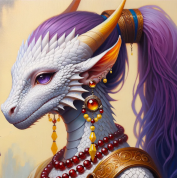
Draconians are humanoid creatures with
dragonblood coursing through their veins. The blood from different
dragon species means that there are a variety of Draconians whose
color and abilities reflect those dragons they a linked to.
Other humanoids refer to draconians as "Dragonborn"
which is incorrect but tolerated by most Draconians.
About a century into the Third Age, Emperor Sallavar of the
Hestrillites became obsessed with conquering neighboring lands and
expanding his relatively young empire. Having experience in sorcery,
he gathered the most powerful spell shapers in the land and met with
them concerning a way to make his army more devastating and fearful
for Hestrillite enemies.
The sorcerers decided that creating soldiers of draconic origin
would be the best option, for dragons were tough a powerful,
especially with their breath weapons. But after years of
experimentations, they could not crate a humanoid that of pure
dragon blood. They were either mutated horribly or were
uncontrollable.
Finally, someone floated the idea of creating a fusion between humans
and dragons to create a more stable hearty creature that was still
powerful, intelligent, and, most importantly, able to have loyalty
to the empire instilled within them. After decades of trials, where
humans and dragon blood were mixed, the first Draconians were
created. There were found to be every bit as intelligent as humans.
Most importantly, they were loyal and willing to fight for their
country. By the time a century had passed, there were hundreds of
male and female Draconians living in the empire, with most serving
in the military. Today, Draconians live in the empire as free
citizens.
Over time, a rising sentiment grew among not only the Draconians but
of the citizens of the empire, that the Draconians were equal and
should be free to pursue their lives as they see fit rather than
being forced to serve in the military. Most stayed within their
roles in the military, but slowly over time, some went their own
way, even moving out of the empire to seek their fortunes elsewhere.
Relatively speaking, the overall Draconian population in Irith is
small but stable.
Draconians breed by means of copulation. Unlike humans, however, the
females will, after impregnation, lay their eggs in a clutch
usually numbering 2-8 eggs that hatch in four months. The must be
kept in a dark, warm, moist environment and tended to religiously if
they have any chance of hatching successfully. Draconians age at the
same rate as humans after that.
Top of Page
Dracothel (Kobolds)
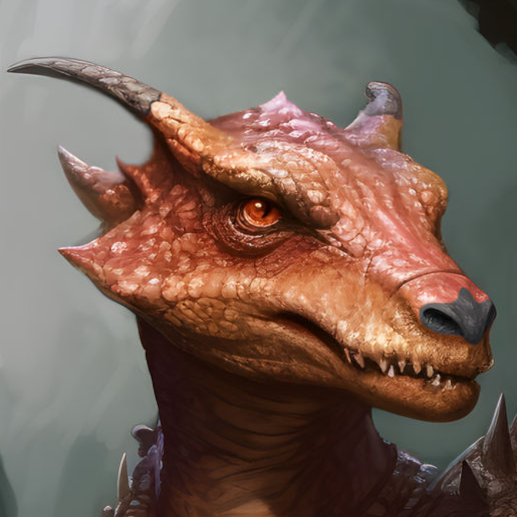
Humanoids with a some dragon blood in their
veins, these skulking but very clever creatures can be found mostly
in hills, mountains, and forests. The true name of their race is the Dracothel, which is draconic for "dragon kin." Kobold,
which another name they are often called, is an ancient name they have borne from the days
of their enslavement at the hands of goblins and hobgoblins.
NOTE: For playable information regarding
this species, go
HERE.
Top of Page
Outhiri (Halflings)
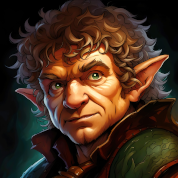
These mostly pleasant small folk are said
to have some gnomish blood in them, but no one has ever been able to
verify this. The true name of their race is "Outhiri." As they became integrated into civilized society of mostly humans,
they were looked at as small humans and began being referred to as "Halflings." In
predominately halfling societies, they will refer to themselves as Outhiri
but tolerate the Halfling moniker in most cases.
Top of Page
Sethraak (Lizardfolk)
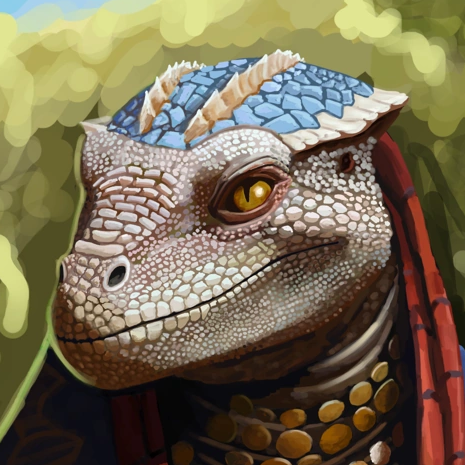
Living primarily in wetlands, jungles, and
forests, this reptilian humanoid race is referred to inaccurately by
other races as "Lizardfolk "Sethraak.
Lizard Folk is a slang name that humans call them.
Clever and full of creativity, they are a
hearty race who tend to be suspicious of others until trust has been
gained.
NOTE: For playable information regarding
this species, go
HERE.
Top of Page
Shenuri (Drow)
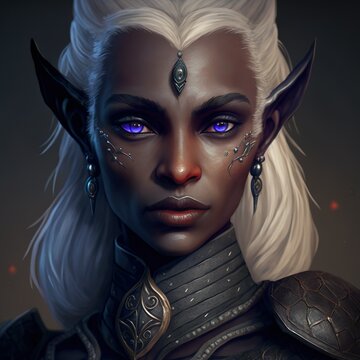
Dark elves in Irith are
called "Shenuri," but are sometimes referred to by the derisive
elven term "Drow," which stands for "Lost."
The Shenuri are a race that has made their place in the underground away from
those who would oppress them and the sun that hurts their eyes and
dries their skin. A page with more information regarding the
Shenuri, along with their cities, populations, etc. on each
continent can be found
HERE.
Top of Page
Torozen (Svirfneblin or Deep Gnome)

Subterranean-dwelling cousins of the
Gnomes, the "Torozen" are a race of dark gnomes who usually live in Shenuri cities or
communities near them. They are often referred to as "Svirfneblin"
by gnomes, which is a slanderous term that was lost in translation
long ago.
Torozen are usually crafty and sadistic,
and they do not tolerate uninvited guests into their communities
NOTE: For playable information regarding
this species, go
HERE.
Top of Page
Homebrew Races With
Playable Information
Half-Tabaxi
Kryth
Qiran Esh
Ratkin
Thriiche
Half-Tabaxi

Even if tabaxi are generally known as
catfolk, most of them would probably resent being compared to a
simple cat. The half-tabaxi on the other hand resemble those animals
a lot more. They've lost most of their tabaxi features and became
more human. Some don't have a single patch of fur on their body or
completely lost their claws. What still remains are their instincts
and natural ability to move with grace and composure. Most would
describe them as serene and delicate.
Being part human and part tabaxi, it's
natural for them to develop a strong wanderlust. The world has a lot
to offer and half-tabaxi would like to see every facet of it. They
value experiences over coin and tend to be more inclined to take
risks. Depending on the individual, some half-tabaxi enjoy learning
from books as much as first-hand experiences. It's hard to guess
their motivation as they tend to be as complex as their human
ancestors when it comes to reasoning.
Some half-tabaxi may be hard to convince,
but once someone earned their trust, they're going to be loyal
friends for life. They prefer traveling with groups of people and
know that strength doesn't lie in numbers, but in unity. Therefore
most try to get along with everyone around them. Even if they
dislike an individual, they rather see them as a friendly rival than
an enemy.
Half-Tabaxi Traits
Ability Score Increase: Based upon
chosen background.
Age: Half-Tabaxi have life spans
equivalent to humans.
Alignment: As with most catfolk,
half-tabaxi tend toward chaotic alignments, as they are impulsive
and often stubborn. Whether they are good, evil or anything in
between depends largely on their social environment.
Size: Depending on the more dominant
side of your character, they're either a similar size to most humans
or slightly taller and leaner. Your size is Medium.
Speed: Your base walking speed is 30 feet.
Cat's Talent: You have proficiency
in the Perception and Stealth Skills.
Feline Agility: Your Tabaxi blood
gives you improved agility and speed. When you move on your turn in
combat, you can double your speed until the end of your turn. Once
you use this trait, you can't use it again until you move 0 feet on
one of your turns.
Darkvision: Since you are part
Tabaxi, you have their superior vision. You can see in dim light
within 60 feet of you as if it were bright light, and in darkness as
if it were dim light. You can't discern color in darkness, only
shades of gray.
Superior Hearing: You have a pair of
catlike ears, giving you
advantage on Perception checks that rely on hearing.
Languages: You can speak, read and
write Common and one other language of your choice.
Subrace: Each child of a human and a
tabaxi has generally more features of one of their parents. This
goes beyond the color of skin, hair or eyes and comes with certain
ability developments. All half-tabaxi are either
animalistic or cultured.
Animalistic Subrace
As a more animalistic half-tabaxi you've
inherited most of your being from your tabaxi parent. In addition to
your cat ears and tail you still have retractable claws. You can
have one or more additional features that show your heritage. Either
choose them yourself or roll on the following table as many times as
you like, but at least once.
Animalistic Features
|
d4 |
|
Feature |
|
1 |
|
Cat
Eyes |
|
2 |
|
Cat
Nose |
|
3 |
|
Whiskers |
|
4 |
|
Fur on
hands and Feet |
Cat's Claws: Because of your claws, you have a climbing speed
of 30 feet. In addition, your claws are natural weapons, which you
can use to make unarmed strikes. If you hit with them, you deal
slashing damage equal to ld4+your Strength modifier, instead of the
bludgeoning damage normal for an unarmed strike.
Moody Feline: Tabaxi are known for their mood swings and
half-tabaxi are generally better at managing their emotions. You
have proficiency in either the Intimidation or Persuasion skill. You
can switch this proficiency after every long rest if you wish to,
depending on your character's mood.
Cultured Subrace
Half-Tabaxi that inherit more from their
human parent are considered as cultured half-Tabaxi. They have their
signature cat ears and tail, but lack any other tabaxi feature. In
exchange for that, they are known to be more adaptable to unknown
situations and are generally more accepted in most cultures than
their more animalistic counterpart.
Avid Learner: You're fascinated by the world and eager to
explore and learn as much as you can. You gain proficiency with one
skill of your choice as well as one tool of your choice.
Curious Feline: You have a hard time not fussing over things
you don't understand. You gain advantage on Investigation checks
that are related to the gathering of information about people,
places or objects.
New Races Menu
Top of Page
Kryth

The Kryth are a race of humanoids bred to be servants of
Illithid.
Kryth are mutated humans infused with Illithid blood. Over the
centuries, some Kryth have escaped their masters to propagate in the
world abroad. They are reclusive and wary of others, even their own
kind.
Mostly hairless, Kryth have rough gray skin that appears hard and dry. They
have some horns that come off their temples and extend behind their
heads, and their eyes are always a light red in color.
Kryth Traits
Kryth share certain traits as a result of their abyssal descent.
Ability Score Increase:
Based upon chosen background.
Age: Kryth mature at the same rate as humans plus 20 years
longer.
Alignment: The makeup of the Kryth cause them to lean toward
more lawful neutral or evil.
Size: Kryth are about the same size and build as humans. Your
size is medium.
Speed: Your base walking speed is 30í.
Darkvision: Thanks to your Illithid heritage, you have
superior vision in dark and dim conditions. You can see in dim light
within 60 feet of you as if it were bright light. and in darkness as
if it were dim light.
Psychic Resistance: You have advantage on saving throws vs.
spells/magic that deal psychic damage and have resistance to psychic damage.
Illithid Legacy: You know the Minor Illusion cantrip. Once
you reach 3rd level, you can cast the Detect Thoughts spell once per
long rest. Once you reach 5th level, you can cast the Fear spell
once per long rest. These spells are intelligence based.
Languages: You can speak, read, and write common and
undercommon.
New Races Menu
Top of Page
Qiran Esh

These mysterious metallic automatons
originate from the secretive country of Kharamis. They have long
been thought to be nothing more then mindless constructs built do the Kharamisians' bidding. But whispers of them being more than that
have come to light, adding further to their mystique. Some say they
are actually beings that have the ability to think for themselves.
They have even been dubbed Qiran Esh (elven for "spirit shell").
Qiran Esh Traits
Score Increase:
Based upon chosen background.
Age: A typical Qiran Esh
is between two and thirty years old.
The maximum lifespan of the
Qiran Esh remains a mystery; so
far, Qiran Esh
have shown no signs of deterioration due to age. You are immune to
magical aging effects.
Alignment: Most Qiran Esh
take comfort in order and discipline, tending toward law and
neutrality. But some have absorbed the morality Ė or lack thereof Ė
of the beings with which they served.
Size: Your size is Medium. To set your height and weight
randomly, start with rolling a size modifier.
*Size modifier = 2d6
*Height = 5 feet + 10 inches + your size modifier in inches
Weight in pounds = 270 + (4 x your size modifier)
Speed: Your base walking speed is 30
feet.
Constructed Resilience: You were
created to have remarkable fortitude, represented by the following
benefits:
*You have advantage on saving throws against being poisoned, and you
have resistance to poison damage.
*You donít need to eat, drink, or breathe.
*You are immune to disease.
*You don't need to sleep, and magic can't put you to sleep.
Sentry's Rest: When you take a long
rest, you must spend at least six hours in an inactive, motionless
state, rather than sleeping. In this state, you appear inert, but it
doesnít render you unconscious, and you can see and hear as normal.
Integrated Protection: Your body has
built-in defensive layers, which can be enhanced with armor.
*You gain a +1 bonus to Armor Class.
*You can don only armor with which you have proficiency. To don
armor, you must incorporate it into your body over the course of 1
hour, during which you must remain in contact with the armor. To
doff armor, you must spend 1 hour removing it. You can rest while
donning or doffing armor in this way.
*While you live, your armor can't be removed from your body against
your will.
Specialized Design: You gain one
skill proficiency and one tool proficiency of your choice.
Languages: You can speak, read, and write Common and one
other language of your choice.
NOTE: Indigenous Qiran Esh living their
normal existences in Kharamis and following societal laws and norms
are not allowed to use arcane or divine magic. Many Qiran Esh that
have left Kharamis and experienced the world beyond its borders have
learned to use magic.
New Races Menu
Top of Page
Ratkin
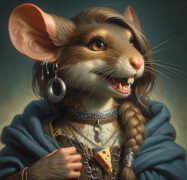
Although primarily found in urban
environments, Ratkin can be found living anywhere, with deserts and
the arctic being rare exceptions. They are communal and are
inherently wary about those not of their pack. These humanoids are
tenacious and very adept at hiding.
Ratkin Traits
Ability Scores: Based upon chosen
background.
Age: Ratkin live to be 70 and are
considered adult at 17.
Alignment: Ratkin can be of any
alignment, but they do tend to lean toward Chaotic Neutral.
Size: Small.
Speed: Walking speed is 30'.
Darkvision: Ratkin have darkvision
up to 60'.
Pack Tactics: Ratkin have advantage
on attacks vs. enemies engaged in melee with an ally.
Rodent Empathy: Ratkin have
advantage on Animal Handling checks with rodents.
Skulk: Ratkin gain advantage to
Stealth Checks when within 5' of an object that is the same size as
the Ratkin or larger.
New Races Menu
Top of Page
Thriiche
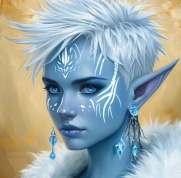
Almost exclusively found at the
Top of the World and on the
Heel of Iirth, Thriiche are an elven subrace that has thrived in
arctic environments for centuries. Less sophisticated than their
high elf cousins, the Thriiche live in a tribal society that values
family above all else. They prefer to live in mountainous areas,
which provide protection from the elements. The only Thriiche cities
known to exist are located at the Top of the World and on the Heel
of Irith, the pages of which will list their names, populations,
leader names, and other relevant information.
The Thriiche worship any number of gods,
with
Dotorus,
Kergon, and
Su Reh being the most common.
Thriiche Traits
(as per elves in the PH with the following subrace traits)
Ability Score Increase:
Based upon chosen background.
Speed: Your walking speed is 30'. If
you are on icy or snow terrain, your
base walking speed increases to 35'.
Darkvision: 60'.
Heightened Perception: You have
advantage on Perception checks when in an icy or snowy environment.
Frost Veil: In icy or snowy
environments, you have advantage on hide checks.
Cold Resistance: You have advantage
on saving throws against cold spell effects and resistance to cold
damage.
Spells: You can cast Ray of Frost
cantrip. At 3rd level, you can cast Ice Knife once per day. The
ranged spell attack is your proficiency bonus plus your wisdom
bonus.
Languages: In addition to common and
elven, you can speak undercommon.
New Races Menu
Top
Religion
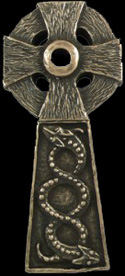 Religion
is a funny thing. Some people take it serious to the point of extreme,
while others look at it as a way to purge their sins in a formalized way
that will cleanse their souls, or at least their guilt de jour. In Irith,
there are a great many gods out there for all to worship, which leads to
some interesting conflicts and alliances.
Religion
is a funny thing. Some people take it serious to the point of extreme,
while others look at it as a way to purge their sins in a formalized way
that will cleanse their souls, or at least their guilt de jour. In Irith,
there are a great many gods out there for all to worship, which leads to
some interesting conflicts and alliances.
The gods/devils/demons/other in my world are a mix
of homebrew entities that I've been working on for years. I've striven to
provide players with a mix of different philosophies that suit good, bad,
ugly, pretty and whatever else you can think of.